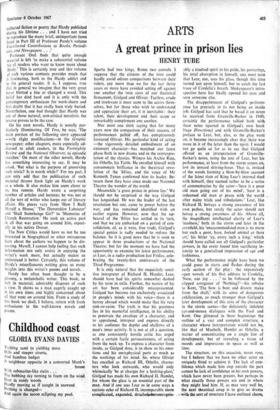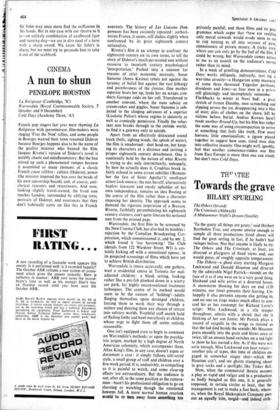A great prince in prison lies ARTS
HENRY TUBE
Sparta had two kings, Rome two consuls. I suppose that the citizens of the time could hardly avoid odious comparisons between their rulers, any more than we for the last thirty years or more have avoided setting off against one another the twin stars of our theatrical firmament, Gielgud and Olivier. Tactless, crude and irrelevant it must seem to the actors them- selves, but for those who wish to understand and appreciate their art, it is inevitable: their talent, their development and their scope so remarkably complement one another.
Nor must one shirk saying that for many years now the comparison of their success, of performances pulled off, has conspicuously favoured Olivier. His particular kind of acting —the vigorously detailed embodiment of an extrovert character—has matched our latest phase both in new drama and in the reinterpre- tation of the classics. Witness his Archie Rice, his Othello, his Tattle. He enrolled himself with consummate brilliance in the theatrical revo- lution of the 'fifties, and the voice of Mr Kenneth Tynan confirmed him its leader. Be- tween them they have since made our National Theatre the wonder of the world.
Meanwhile 'a great prince in prison lies.' We should not be surprised at the way Gielgud has languished. He was the leader of the last revolution but one, came to power before the war, and has remained identified with an earlier regime. However, now that the up- heaval of the 'fifties has settled in its turn, and that we are embarked on a period of con- solidation, of, as it were, free trade, Gielgud's special genius is sadly needed to redress the balance. So it is good news that he is soon to appear in three productions at the National Theatre; but for the moment we have had the opportunity to examine his latest performance, as Lear, in a radio production last Friday, cele- brating the twenty-first anniversary of the Third Programme.
It is only natural that the exquisitely sensi- tive interpreter of Richard II, Hamlet, Lear, should have had his spirits somewhat dashed by his term in exile. Further, the nature of his art has been considerably misrepresented. Gielgud has become too exclusively associated in people's minds with his voice—there is a heresy abroad which would make that his very sink-or-swim. The truth is that his greatness lies in his masterful intelligence, in his ability to penetrate the envelope of a character, and to apprehend, interpret and express directly to his audience the depths and shallows of a man's inner activity. It is not at all a question, as one consistently hostile critic has urged with a certain facile persuasiveness, of acting from the neck up. To express a character from inside, as Gielgud does, is to show us his emo- tions and his metaphysical parts as much as the workings of his mind. So, where Olivier has excelled as Richard III, Othello, charac- ters who look outwards, who would only whimsically 'be at charges for a looking-glass,' Gielgud has made his own Richard II, Hamlet, for whom the glass is an essential part of the man. And if one sees Lear as in some ways a curious echo of Richard II, incomparably more complicated, expanded, detailedarsitvirecognis-
ably a kindred spirit in his pride, his posturings, his total absorption in himself, one must note that Lear, too, uses his glass, though this time turned not upon himself, but to catch the last trace of Cordelia's breath. Shakespeare's intro- spective hero has finally opened his eyes and seen someone else.
The disappointment of Gielgud's perform- ance lay precisely in its not being an inside job. Gielgud has said that he based it on notes he received from Granville-Barker in 1940; certainly the performance tallied both with these notes (quoted in Gielgud's own book Stage Directions) and with Granville-Barker's preface to Lear, but, alas, as the .play went on, it became increasingly clear that there was more in it of the letter than the spirit. I would not go quite so far as to say that Gielgud offered us an interpretation of Granville- Barker's notes, using the text of Lear, but his performance, at least from the storm scenes on, lost its inward driving-force. That is, instead of the words forming a blow-by-blow account of the latest state of King Lear's internal duel with himself, they seemed rather to be a series of commentaries by the actor—'here is a poor old man going out of his mind', 'here is redeemed old man at peace with the world , after many trials and tribulations.' Lear, like Richard II, betrays a strong awareness of his own pathos, but surely the actor should not betray a strong awareness of his. Above' all, the magnificent intellectual clarity of Lear's `madness,' both in the storm and later in the cornfield, his 'unaccommodated man is no more but such a poor, bare, forked animal as thou art,' his bitter 'ay, every inch a king,' which should have called out all Gielgud's particular powers, in the event found him sacrificing in- tensity to a generalised impression of age and feebleness.
What the performance might have been we could guess in starts and flashes during the early section of the play: the expansively open vowels of his first address to Cordelia, 'Now, our joy . . . .' to be followed by the clipped arrogance of `Nothing?'—his rebuke to Kent, The bow is bent and drawn; make from the shaft,' with its sense of dangerous exhilaration, so much stronger than Gielgud's later development of this area of the character in the storm scenes—the deliciously indolent cat-and-mouse dialogues with the Fool and Kent. One glimpsed in these beginnings the outline of a vast and complex structure, a character whose interpretation would not be, like that of Macbeth, Hamlet or Othello, a matter of concentrating on a single line of development, but of revealing a tissue of moods and impressions in space as well as time.
The structure, on this occasioh, never rose, but I believe that we have no other actor so uniquely fitted to achieve it. The lack of con- fidence which made him step outside the part cannot be lack of confidence in his own powers, which have never been greater, but perhaps in what exactly those powers are and in where they might lead him. If, as may very well be, the next theatrical coup is to give us drama ..witikthe sort of structure I have outlined above,
Sir John may once more find the oriflamme in his hands. But in any case with our theatre as it is—an unlikely combination of cardboard tiger and running dog—we are in dire need of a hero with a sharp sword. We know Sir John's is sharp, but we must try to persuade him to take it out of the scabbard.



































 Previous page
Previous page